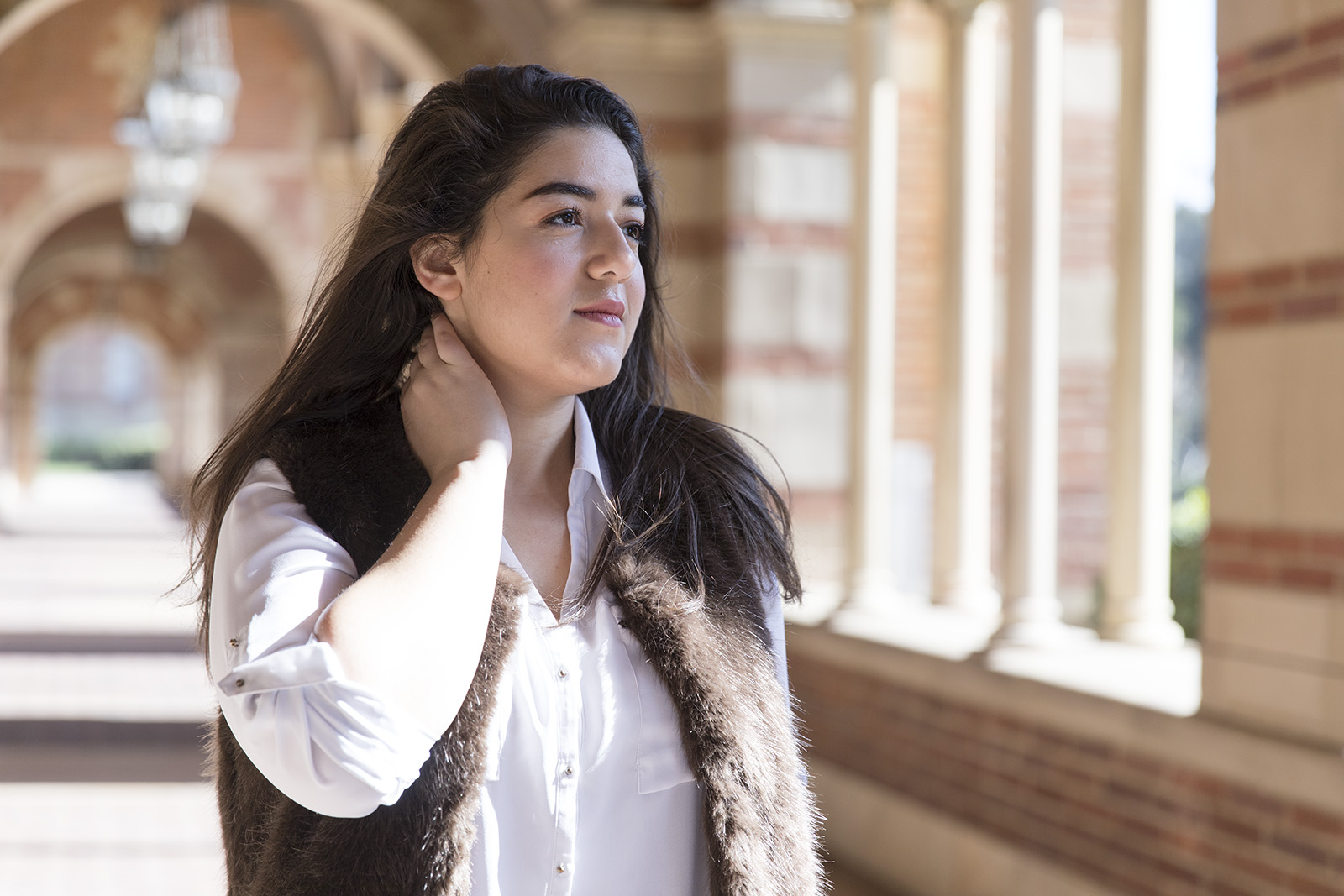Student reflects on immigrant identity, anti-Muslim prejudice in US

Nadine El Fawal, a first-year microbiology, immunology and molecular genetics student, immigrated to Virginia from Egypt four years ago and said she experiences discrimination because of her identity. (Dayoung Lee/Daily Bruin)
By Emily Merz
Jan. 17, 2017 12:55 a.m.
Nadine El Fawal was apprehensive about moving to a new country at age 14, but her mother said that in America, her dreams would come true.
El Fawal, a first-year microbiology, immunology and molecular genetics student, immigrated to Virginia from Egypt four years ago. She said she feels more free in the U.S. than in Egypt, but she was also shocked by the anti-Muslim prejudice she encountered, especially during President-elect Donald Trump’s campaign.
“It’s unfortunate that people like me … have to work a lot harder to be on the same level,” El Fawal said. “With Trump becoming president, preaching hate and us-versus-them mentality, that would be exacerbated.”
El Fawal said she imagined the U.S. as a safe haven, but she experienced racial discrimination which she had not faced in Egypt.
[Related: Teaching fellow explores identity through language, literature]
In Egypt, El Fawal said she was often harassed for being a woman. Men would grab her or call her a “slut” if they believed she was not properly dressed, she said.
She added she could not be a cardiac surgeon like she wants to in Egypt because it was not socially acceptable for women to be doctors.
However, when she moved to the U.S. four years ago, she began facing a new kind of discrimination. Though she doesn’t practice her religion strictly and does not wear a hijab, people have made negative comments about her identity as an immigrant and Muslim.
At first, she thought the prejudice she experienced was just rudeness, but as she got older, she realized people’s comments are tied to her religion and ethnicity, she said.
“I don’t particularly stand out as Muslim but ever since the election I’ve wanted to tell people I’m Muslim and I’m proud of it,” El Fawal said.
Soon after immigrating to the U.S., El Fawal and her mom were speaking to each other in Arabic in a supermarket when an older woman told them that they should not be speaking in a terrorist language and to go back to where they came from.
[Related: Human Rights Night panelists address refugee crisis, human trafficking]
“I wanted to fight back,” El Fawal said. “My mom told me to rise above it. Fighting back would only prove her point.”
In El Fawal’s high school government class, a student spoke in garbled Arabic pretending to shoot students. El Fawal asked him to stop.
“He asked me, ‘What are you going to do about it? Kill me? Blow me up?’” El Fawal said.
El Fawal added she did not know how to respond to his threatening questions.
“If I stand up for myself, I prove his point, but if I don’t, I’m not defending myself,” she said.
Nora Titus, El Fawal’s cousin who came to the U.S. when she was 2, said El Fawal experienced culture shock when she moved to the U.S.
“Nadine was used to having to work for what she wanted and when she came to America she saw people (are given) a lot more (privileges),” Titus added. “She did adapt, but I knew it was hard for her.”
Despite her negative encounters, El Fawal said she believes it is possible to change people’s perspectives about Muslims and immigrants. El Fawal said she thinks she has shown Americans that Muslims are kind and not the hateful people that Trump wants others to believe.
A dining hall employee who once overheard El Fawal speaking in Arabic told her she hoped El Fawal was not a Muslim, El Fawal said. El Fawal responded that she was Muslim and sat down with the employee to explain her faith. After their conversation, the employee changed her perspective about Muslims, El Fawal said.
Though Trump’s rhetoric and representation of Muslims as un-American bothered her during the campaign, El Fawal said she is not fearful of what Trump will do as president. She is most afraid of the hate crimes she believes Trump supporters continue to commit.
El Fawal added she recognizes that America is flawed, but she thinks the racial tolerance in the U.S. can hedge against the currently divided political climate. For El Fawal, the best thing people can do to fight discrimination is being kind and active in promoting tolerance.
“Let the people around you know they are loved,” El Fawal said.
—
Read more Daily Bruin coverage of the presidential inauguration, along with analysis of California and federal policy under the Trump Administration:


